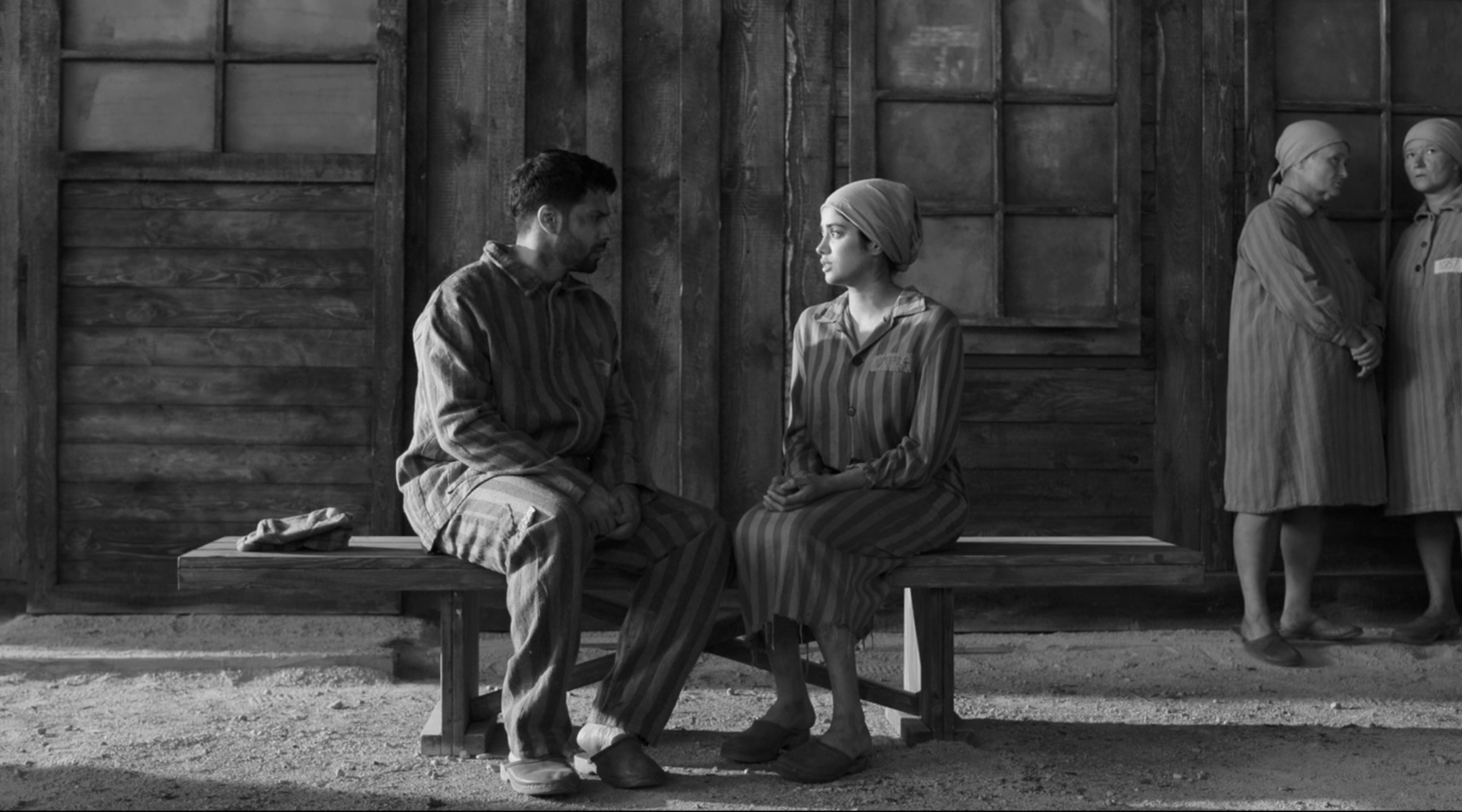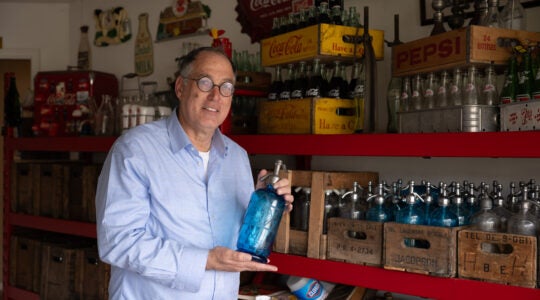(JTA) – At first glance, the new movie “Bawaal” has all the hallmarks of a typical Bollywood romantic melodrama: A self-centered protagonist learns how to be an adult and respect his partner, with the help of corny jokes and some song-and-dance numbers.
But the movie, which Amazon Prime released on Friday through a distribution deal with its Indian production company, takes an unusual route to get there: having its married couple imagine themselves in the Auschwitz death camps.
Visiting the memorial site, they also meet a Holocaust survivor — played by an actor named Richard Tate — who tells them, with a British accent and no elaboration, “Every relationship has its own Auschwitz.” Jews, as a class of people, are barely mentioned throughout the movie.
It’s a plotline that has some critics declaring the movie to be in bad taste, and at least one Jewish group calling on Amazon to remove the film from its platform. But the director and actors have defended the film, saying that they believe the Auschwitz segments were handled appropriately.
“I’m a bit disappointed with the way some people have comprehended it,” director Nitesh Tiwari, who also co-wrote the script with four other credited writers, told an audience in India last week.
“Bawaal” centers on a narcissistic history teacher named Ajay, played by Hindi-language megastar Varun Dhawan, who has been feigning knowledge about World War II to his students — and whose marriage to his wife Nisha (Janhvi Kapoor) is on the rocks. To save his job and his marriage, Ajay and Nisha embark on a trip to visit war landmarks throughout Europe. Along the way, Ajay records on-the-ground video lessons for his students back home in Lucknow. (Most of the film’s dialogue, with the exception of the survivor’s lines, was not originally spoken in English.)
Ajay learns about the horrors of the Holocaust, and the couple use the atrocity as a metaphor for their marriage. “The world war is over, but no one knows when the war we fight within will end,” Nisha says. Another part of the story has the couple drawing parallels between a bag mix-up at the airport and the Nazis forcing Jews to pack their bags quickly when they were being shipped off to the camps.
The couple’s tour of World War II sites takes them to Paris, the beaches of Normandy, Anne Frank’s house in Amsterdam and Hitler’s bunker in Berlin. Ajay’s lesson to his students about Anne Frank is that she was their age when she had her life cut short; his lesson from Berlin, after wandering through its Holocaust memorial, is that “an image created with the help of lies and propaganda doesn’t last for long.” (“We’re all a little like Hitler,” Nisha muses; “we are not satisfied with what we have.”)
The trip ends at Auschwitz, with Ajay and Nisha touring the death camp and imagining themselves as its Jewish prisoners clad in striped uniforms. During a climactic scene in the gas chambers, Nisha, who has epilepsy, collapses on the ground from shock.
This is the principal scene that has provoked criticism. The Simon Wiesenthal Center, a Jewish human rights group, called on Amazon to remove the film “due to its outlandish abuse of the Nazi Holocaust as a plot device.” A reviewer for The Guardian said the Auschwitz sequence was “so mind-bogglingly vapid it’s hard to watch,” while adding, “Western films have pulled this sort of stunt before, of course, with other countries’ histories, so it’s an education of sorts to see it done in reverse.” The Hindustan Times called it “the most insensitive movie of the year,” adding that the gas chamber scene “is an excruciatingly horrible and shameful depiction, in which [the] Holocaust is but a narrative scapegoat for the characters to face their fears and save their toxic marriage.”

(Nadiadwala Grandson Entertainment)
“Bawaal” is far from the first piece of pop-culture to offer a Holocaust narrative decried as insensitive. The bestselling book and movie “The Boy in the Striped Pajamas” depicted a friendship between a Jewish concentration camp prisoner and the son of a Nazi guard — an implausibility not based in the historical record of how the camps functioned. Teen romance “The Fault In Our Stars” included a visit to the Anne Frank house — which, as in “Bawaal,” functioned as an aphrodisiac.
But the “Bawaal” filmmakers say they had good intentions and that they paid proper deference to the historical sites, which they chose because they said Indian audiences would be less familiar with them as cultural touchstones.
“Don’t we see Ajay and Nisha getting completely troubled and moved by what they see in Auschwitz?” Tiwari said. “They see the prisoners. They see the people, how they were stacked. They see the people, how they were exterminated and stuff like that. And every physical torture people went through. And are they being insensitive about it? No. They are moved to tears.”
Kapoor, who plays Nisha, further added that the characters reacted to Auschwitz much as any modern-day visitor would.
“I know when I went to these places, my first organic thought was, ‘If this was me, what would I do? If this was me and my family?’” she recalled. “It realigned something within me.”
Kapoor added that an unnamed Israeli “professor at an Ivy League university” who “had ancestors who unfortunately did not survive the Holocaust” told her that he had been “very moved” by the film, “and never once in the conversation did he even allude to being offended by anything.”
Dhawan dismissed people who he said were “triggered” by the film, adding, “I don’t understand where that sensitivity and that trigger goes when they watch, suppose, an English film.” He referenced an unnamed “recently released” film that he said is “important to our culture and our country”; some Indian media outlets speculated that he was discussing “Oppenheimer,” the biopic about the Jewish designer of the atomic bomb, which includes a reference to the physicist’s quotation of the Bhagavad Gita.
Even as the couple in “Bawaal” are comparing themselves to Holocaust victims, they also emphasize that they have things a lot better. “The sorrows we face,” Nisha says at one point, “are nothing in comparison to the pain they suffered every day.”
JTA has documented Jewish history in real-time for over a century. Keep our journalism strong by joining us in supporting independent, award-winning reporting.






